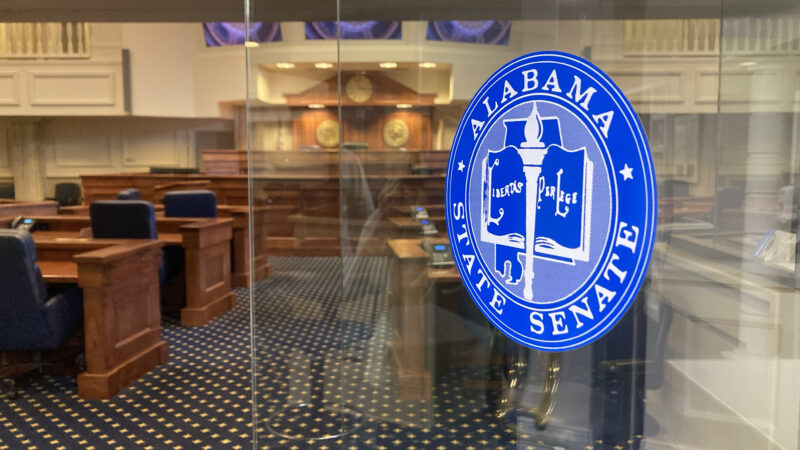Rocky start for Alabama school choice bill
Republican lawmakers in Alabama held their first committee meeting this week on a school choice bill which would give families $6,900 in taxpayer money through an education saving account to be used for private school or homeschooling. The bill faced significant criticism.
“It wasn’t a tremendously favorable reception for sponsors of the bill,” said Todd Stacy, host of Capitol Journal on Alabama Public Television.
Stacy discussed that and other action in the legislature this week.
Choosey on choice
The bill is very broad, in part, because there are no income restrictions. Families who currently have children in private school or home school are eligible. Proponents said parents are in the best position to choose the education option that’s best for their children but Stacy said the big hangup for members of the Senate Education Policy Committee Wednesday was accountability.
“There aren’t the kind of guardrails with accountability that other states have passed in their similar school choice laws,” Stacy said.
Lawmakers questioned the lack of a testing requirement or other mechanism that could assess how students using the education savings accounts were performing academically.
“A lot of folks in the education space and the legislature, they’ve been working hard over the last several years to bring up Alabama’s scores. This doesn’t go in line with that,” Stacy said. “I would say a majority of this committee are for school choice the concept … but there are particulars of this bill that make it problematic.”
Following the public hearing, the committee chairman announced the bill would move to the Senate education budget committee because of the budget impact. The Legislative Services Agency estimated it could cost the education budget $576.1 million if 5% of eligible public school students participated.
Meanwhile, the House Education Budget Committee took up a narrower school choice bill called the SUN Act or Students with Unique Needs. This bill would also use education savings accounts but offer only $5,600 in taxpayer money and limit participation to 500 students. Students must also have a parent in the military, are in the foster care system or meet other specific criteria.
“For that reason I actually think this is going to move in the legislature,” Stacy said. “For those who want the broader school choice, the whole hog proposal, this could be a starting point.”
Step one for the General Fund
On Tuesday, the House unanimously passed a General Fund budget of more than $3 billion, backed by flush tax receipts. The budget is about $15 more than what Gov. Kay Ivey proposed.
“The only reason for that is that they see revenue projections going even higher just in these couple of months that have passed,” Stacy said.
Essentially all non-education state agencies would receive funding increases under the spending plan, with notable bumps for the Department of Mental Health and Department of Public Health. State employees would see a 2% pay raise. The bill now goes to the Senate.
Harsher penalties for retail theft
Alabama retailers and district attorneys have said theft is becoming a major problem.
“In fact causing stores to either close down or consider closing down, which is a real problem especially in places that are lacking options to begin with,” Stacy said. “They say the state [and] prosecutors need better tools to crack down.”
House and Senate committee heard a pair of bills this week which would increase penalties for those convicted of theft regardless of the amount that is stolen. Proponents say current law means those individuals often skip time behind bars. Opponents expressed concern about how broadly the bill would apply, particularly with no minimum for the value of the item taken.
The bill also creates a new crime of organized theft.
“They’re saying what’s going on isn’t just petty [theft], but organized folks are going and stealing certain items in a group and then selling those items,” Stacy said.
A Senate version of the bill passed committee while the House version stalled.
Other action
House Judiciary Committee approves stripped-down parole bill
Alabama senators back bill to cut state sales tax on food
Includes reporting from the Associated Press
Alabama prison chief responds to families’ criticism
The department said that a number of changes have been made since Corrections Commissioner John Q. Hamm was appointed in 2022. The department said hiring has increased, and there are ongoing efforts to curb the flow of contraband and improve communications with families.
40 years after ‘Purple Rain,’ Prince’s band remembers how the movie came together
Before social media, the film Purple Rain gave audiences a peak into Prince’s musical life. Band members say the true genesis of the title song was much less combative than the version presented in the film.
Park Fire in California could continue growing exponentially, Cal Fire officer says
Cal Fire has confirmed that over a hundred structures have been damaged in the Park Fire, which grew overnight near Chico, Calif. Difficult firefighting conditions are forecast through Friday night.
Checking in with Black voters in Georgia about the election, now that Biden is out
Some voters who could be key to deciding who wins Georgia. What do they think about Vice President Harris becoming the frontrunner in the race to be the Democratic nominee?
Tahiti’s waves are a matter of ‘life and death’ for surfing Olympics
Tahiti's Teahupo'o wave has a slew of riders for the Paris 2024 Olympics. NPR finds out why it's called one of the most dangerous waves.
Researchers are revising botanical names to address troubling connotations
Since the mid-1700s, researchers have classified life with scientific names. But some of them have problematic histories and connotations. The botanical community is trying to tackle this issue.




